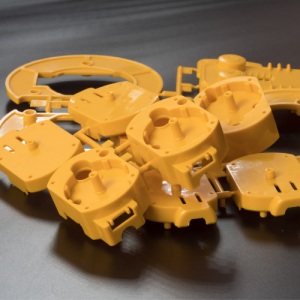
What does the future of plastic injection molding look like? Consider this.
According to Global Sources:
If there’s one manufacturing process that has driven the most growth in the plastics industry, it’s injection molding. Over the years since its development, plastic injection molding has grown to be one of the most widely implemented manufacturing processes for many sectors: electronics, automotive, home appliances, housewares, and even in the medical and aerospace industries. As of today, plastic injection molded parts and products have become so common that nearly everything we see and use is made by the process.
As new trends and challenges emerge to make an impact in the future of plastic injection molding, let’s have a quick review of how the process works and what makes it so popular.
Plastic injection molding is a manufacturing process that uses melted plastic granules fed or ‘injected’ into a custom-made mold cavity where it eventually cools down and takes the shape of the mold. The process yields results with impeccable precision and compliance to specifications – and is able to do so for thousands or even millions of times in succession, hence its adoption by millions of manufacturing companies.
Trends to expect
Sustainability, medical applications and the dynamics of offshore and onshore manufacturing are some factors that will drive trends and create pitfalls for the plastic injection molding industry.
Medical industry
Discussing the current landscape of the industry in a November 2020 news post, Washington-based plastic injection molding company SEA-LECT Plastics forecasts an increase of injection molded plastic products in the medical industry. The company mentions that biocompatibility, design flexibility and recycling options are some of the few drivers of the shift from metal medical components to plastic.
Moreover, plastic components allow for more compliance with regulations and can be a well-timed offering in a global marketplace limited by their metal counterparts.
Based on business intelligence and statistical surveys, a recent report from Market.us forecasts
the market for plastic injection molding for medical devices will generate a global revenue of $136,167 million by 2028.
Sustainability efforts
The same article from SEA-LECT Plastics underlines the global shift to sustainability, which entails changes made to the processes and materials used in the plastic manufacturing industry.
As sustainability trends in 2021 push for 100 percent recyclability, consulting experts now offer solutions for businesses on how they can be more eco-friendly and augment their recycling practices by shifting to biodegradable plastics.
From offshore to local
The negative impacts of the COVID-19 pandemic spared no industry – not even the strongest businesses that outsource manufacturing to offshore plastic injection OEMs remain unaffected. Disruption in the product supply chain, particularly in the medical sector, is a factor seen to drive the need for American companies to replace overseas supply chains with local manufacturers. As discussed by Harry Moser, founder and president of the Reshoring Initiative, in an October 2020 Q&A with manufacturing industry association SME, the reshoring of US manufacturers will be driven by the shortage of medical products arising from the need to import. Moser added that other leading industries, such as transportation equipment, appliances, plastic and rubber products, fabricated metal products, electronics and apparel are encouraged to follow this strategy.
“Reshoring would allow for higher quality, longer life and faster response to opportunities. Having the ability to reduce costs in mold production, along with the reduction of transportation costs, would put mold makers in a stronger, more sustainable competitive position,” JM Performance Products Inc. president John Stoneback, speaking at the same Q&A, added.
What this means for buyers
Keeping a close eye on the latest industry trends, including how the supply chain will change in the midst of a pandemic, plays a huge part in streamlining the sourcing process of any business. In the case of plastic injection molding, major OEMs possibly being reshored could mean that a shift to local manufacturers is a smart move to avoid supply-chain interruptions. Knowing which products are high in demand is a major deciding factor in the procurement process.
Global organizations pushing for the industrial shift to sustainability will also mean that now more than ever, consumers will be persuaded to buy eco-friendly products, another factor worth considering when sourcing.